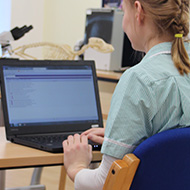
Group welcomes ideas from students and the wider veterinary profession.
A special taskforce to consider possible alternative routes to registration for student veterinary nurses has been formed by the RCVS Veterinary Nurses (VN) Council.
The taskforce will be led by VN Council chair Racheal Marshall and is expected to report back to Council with its ideas by the end of June.
If approved, guidance on alternative assessment methods will be shared with VN educators for them to be able to deliver these alternative assessment methods in time for student veterinary nurses to qualify and join the register in September.
“VN Council understands that this is a difficult and frustrating time for our student veterinary nurses. However, we would like to reassure them that we are committed to addressing the situation, whilst still maintaining the integrity of the profession and public confidence in,” explained Racheal.
“As the saying goes, necessity is the mother of invention, and we will be drawing on a wide range of educational and clinical expertise to innovate our way out of this problem and develop a method that still ensures our students meet the necessary standards while keeping everyone safe. We would, of course, welcome any potential ideas from students and the wider profession on how this can be delivered.”
VN Council recently wrote to veterinary nurse educators asking them to defer their objective structured clinical examinations (OSCEs). The decision came in response to the government's lockdown announcement to curb the spread of COVID-19, and the fact that practical examinations would no longer be possible.
Current guidance for veterinary nursing students states that awarding bodies and higher education institutions must include a summative OSCE examination within their programmes. In light of the COVID-19 restrictions, VN Council considered whether there was sufficient evidence to allow registration without completing the OSCE.
“We have considered a number of alternative methods for veterinary nurses to gain their licence to practise qualifications that does not include undertaking their final OSCE exams. For example, the use of mock exam results, " said Rachael. "Unfortunately, this evidence demonstrated a wide variation in both content and delivery across centres with some centres not delivering a mock examination at all.
“We also looked at whether students could be allowed to enter the register based on completion of the RCVS Day One Skills for Veterinary Nurses, along with witness testimony or assessments from clinical coaches at the students’ training practices. VN Council considered the impact of this approach and agreed that this would not only put undue stress and pressure on practice staff and resources during an already very stressful time but could also introduce an element of bias to the assessment process.
“It was also acknowledged that the assessment of some skills would require close proximity between student and clinical coach, which should not be encouraged at this time,” she said.



 The latest
The latest